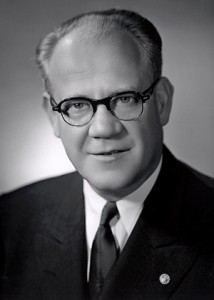
J. Scott Milne created IBEW Local 1324 to help pave the way for Ron Weakley and his CIO supporters to cross over to the IBEW. IBEW Museum
By the end of 1947, Ron Weakley’s dream of one union at PG&E was in deep trouble. He’d been unable to organize PG&E workers outside of the Bay Area. The UWUA had sacked his ally, James Daugherty. The War Labor Board had folded up shop, reducing pressure on PG&E to bargain seriously.
Mert Walters, a Weakley ally on the San Francisco peninsula, believed that the UWUA’s national leadership was a big part of the problem. When he met some of them in person, he suspected they simply wanted to take control of the organization that Californians had organized.
In early 1948, Weakley told another close ally, Don Hardie, he thought it was time to leave the UWUA. Together they met secretly with IBEW officials in San Francisco. Weakley said he would convince the 5,000 UWUA members at PG&E to come over to the IBEW. In exchange, he wanted IBEW to let him create a new local where all members were treated equally and had control over the union’s policies and finances.
J. Scott Milne, IBEW’s International Secretary and a former utility employee himself, saw an historic opportunity in Weakley’s proposition. He understood that Weakley’s followers would be reluctant to join hands with their old adversaries in IBEW 1245. He also understood that IBEW 1245 was not equipped to carry out a system-wide election at PG&E.
In October of 1948, the IBEW International itself petitioned the NLRB for a system-wide election at PG&E. In November, IBEW chartered a new union, Local 1324, to house Weakley’s CIO forces. Milne then put both locals under the direct supervision of the International. One of the greatest American labor organizing campaigns of the post-war era was about to begin.